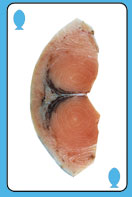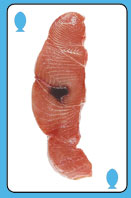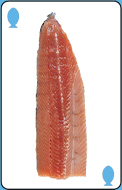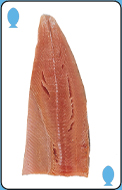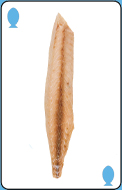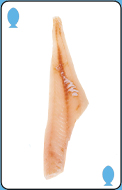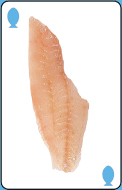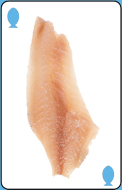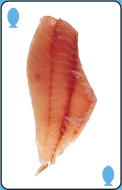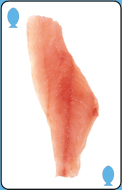


THAT'S RIGHT!
Swordfish is an expensive carnivorous fish that is sometimes mislabeled. Mako shark may be substituted for swordfish, and costs about $2 less per pound. Consumers can avoid buying the wrong fillet. Swordfish skin is smooth while mako shark has a sandpaper-like texture.
SORRY!
This fish is actually mako shark. Swordfish is generally more expensive and sometimes the shark meat, which costs around $2 less a pound, is mislabeled as swordfish. If you're unsure about whether your swordfish is the real deal, check the skin. Mako shark skin has a sandpaper-like texture while swordfish is smooth.

Photos by NOAA

SORRY!
You've chosen farm-raised salmon. Some producers may try to pass it off for wild-caught during off seasons to mark up the price three or four time. Farm-raised salmon contains higher levels of chemicals, higher fat content and artificial colorings. There is plenty of affordable wild-caught salmon during off seasons—check the label and ask the vendor about the origin of the fish.
THAT'S RIGHT!
According to the U.S. Food and Drug Administration statistics, wild caught salmon is higher in protein and lower in fat than most farm-raised salmon. Some producers may try to pass off farm-raised salmon as wild by not mislabeling the fish. Wild salmon cost three to four times more than farm-raised. Be sure to look at the label or ask the vendor the origin of the fish.

Photos by NOAA

SORRY!
This fillet is actually escolar, a tropical fish that is mislabeled as Atlantic cod and can be difficult to digest. This oily fish is not suitable for people with sensitive stomachs. Minimizing portion sizes to under six ounces can help with digestion of escolar. Check with seafood retailers to be sure you know what you're paying for.
THAT'S RIGHT!
Atlantic cod, an excellent source of protein, has been overfished recently and producers may substitute it for escolar. Escolar is an oily fish that is difficult to digest and can cause gastrointestinal illness. Be sure you get what you're paying for.

Photos by NOAA

THAT'S RIGHT!
Grouper has been in such high demand that governments have stepped in to regulate fishing of the species in the Gulf of Mexico. According to the National Oceanic and Atmospheric Administration, mislabeling deflates the price, and fraud has become more common because of declining supply of grouper.
SORRY!
This is actually a fillet of Nile perch, one of the many species passed off as grouper. Grouper has been in high demand and overfished in the Gulf of Mexico, so much so that the government limited fishing. If you're looking for grouper, do your research—the fillet you purchase may actually be Nile perch, tilapia or catfish.

Photos by NOAA

SORRY!
This is actually rockfish, which has been sold as red snapper, according to Oceana. The group's report estimated that other species are mislabeled as red snapper 77 percent to 90 percent of the time. Some other species passed off for red snapper are catfish, tilapia, Nile perch, mahi mahi and Atlantic cod.
THAT'S RIGHT!
While this fillet is actually red snapper, the species of fish may be mislabeled 77 percent to 90 percent of the time, according to an Oceana report. In one instance of fraud, U.S. officials seized 1,200 pounds of rockfish imported for sale as red snapper. Red snapper is one of the most commonly mislabeled types of seafood so do your research when purchasing red snapper.

Photos by NOAA


Click a card to see your score.
Scores 0-1
Bottom feeder.
Increase your ability to spot fish fraud by learning more about what species are commonly mislabeled. Check out Oceana's report, Bait and Switch.
Increase your ability to spot fish fraud by learning more about what species are commonly mislabeled. Check out Oceana's report, Bait and Switch.
Scores 2-3
Just keep swimmin'.
Increase your ability to spot fish fraud by learning more about what species are commonly mislabeled. Check out Oceana's report, Bait and Switch
Increase your ability to spot fish fraud by learning more about what species are commonly mislabeled. Check out Oceana's report, Bait and Switch
Scores 4-5
Seafood savvy.
You know your fish. To find out more about species that are commonly mislabeled, check out Oceana's report Bait and Switch.
You know your fish. To find out more about species that are commonly mislabeled, check out Oceana's report Bait and Switch.
